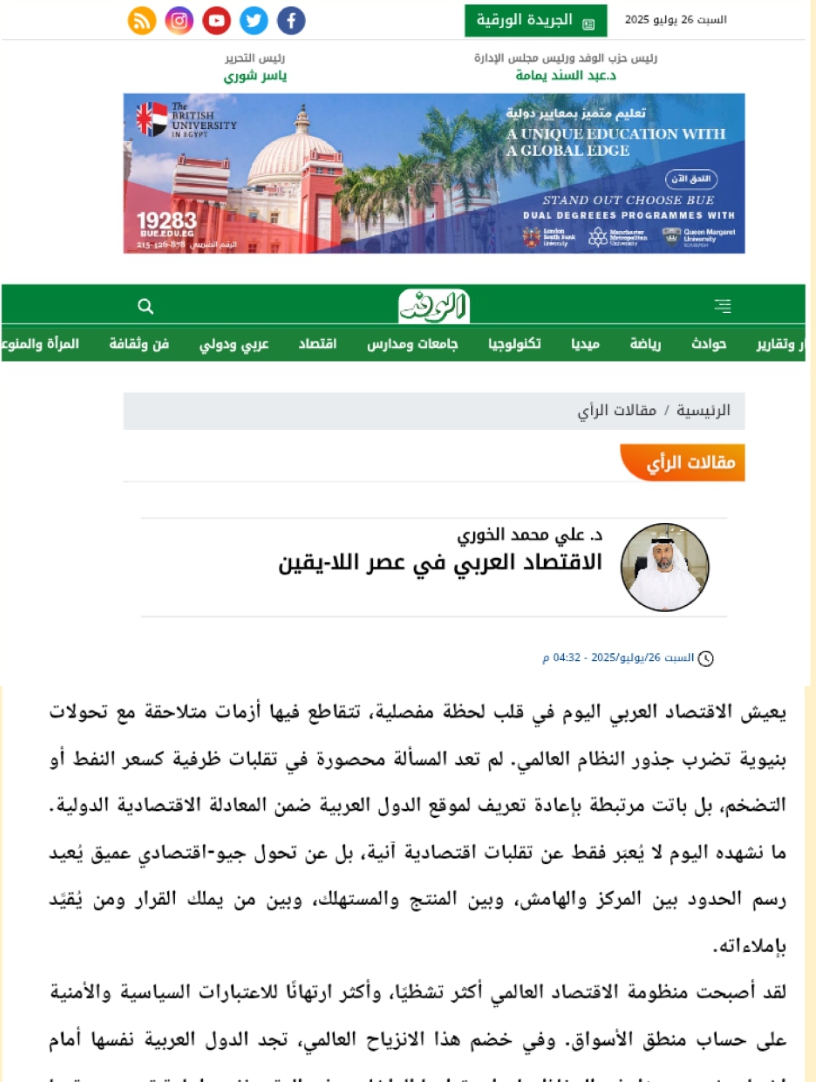Cairo
Source: Al-Wafd Newspaper
Prof. Dr. Ali Mohamed Al-Khouri
Today, the Arab economy is at the heart of a pivotal moment, in which successive crises intersect with structural transformations that strike at the roots of the global system. The issue is no longer limited to circumstantial fluctuations such as the price of oil or inflation, but has become linked to a redefinition of the position of Arab countries within the international economic equation. What we are witnessing today expresses not only immediate economic fluctuations, but a profound geo-economic transformation that redraws the boundaries between center and margin, between producer and consumer, and between those who have the decision and those who are bound by their dictates.
The global economic system has become more fragmented, more dependent on political and security considerations at the expense of market logic. Amid this global shift, Arab countries find themselves facing a double test: maintaining their internal stability while simultaneously redefining their position within an international economic structure characterized by increasing uncertainty. This challenge does not take place in the space of abstract theorizing, but rather is embodied as a strategic dilemma deep within national accounts, and constitutes the real test for decision-makers in the next stage.
In this context, the Arab economy appears to be in a state of structural inequality. Some countries have made great strides in diversifying their sources of income and developing their productive sectors, while others remain captive to oil revenues, relying in their economic planning on energy market fluctuations and geopolitical connections. The Ukrainian crisis, the consequences of the Covid-19 pandemic, in addition to the global wave of inflation and the restriction of monetary policy in major economies, have imposed a new reality in which traditional solutions are no longer valid, and fragmented reforms are no longer able to contain risks.
One of the most prominent sources of fragility in the Arab economic structure is excessive dependence on food imports. The supply chain crisis since 2022 has revealed the fragility of Arab food security and the need to consider new production models that take into account strategic security, not just import efficiency. Also, the high rates of public debt in a number of Arab countries, amid severe social pressures, limit the ability to maneuver financially and restrict governments’ options in the areas of support and productive investment.
In addition to this, there is the challenge of structural unemployment, especially among young people, which threatens social stability and weakens societies’ immunity in the face of crises. As digital transformations accelerate and the nature of jobs changes globally, it has become necessary to reformulate educational and training policies to respond to the changing demand for skills and prepare the workforce to compete in the economy of the future.
Despite these intertwined challenges, there is still plenty of room for maneuver if Arab countries read the stage well. On the one hand, the region has a strategic geographical location that makes it a vital link in global trade networks. It also has renewable natural resources that could serve as a starting point for a more sustainable economic model. Solar and wind energy are no longer just alternatives to traditional energy, but have become projects with a sovereign dimension, enabling countries to build independence in energy sources that redefines their relations with global markets.
At the same time, the digital economy can be a real tool for repositioning Arab economies within the global value chain. If there is political will and strategic vision, technology can open new horizons in the fields of trade, industry, and services, provided that public policies are reoriented towards enabling innovation, creating smart infrastructure, and encouraging entrepreneurship.
On the other hand, developing sectors such as tourism, manufacturing, education, and healthcare is no longer just an economic option, but a necessity to ensure that Arab countries remain on the development map. These sectors, with their potential to generate jobs and increase economic value, could serve as a starting point for a new development model that takes into account local specificities while simultaneously being based on rules of efficiency and competitiveness.
However, this desired transformation cannot be built on a purely national basis, but rather requires real regional cooperation that goes beyond slogans and establishes a flexible Arab market capable of absorbing shocks and generating cross-border growth opportunities. No Arab economy, whatever its capabilities, can survive alone in this fragmented world. Therefore, building productive, investment and commercial integration networks within the Arab region has become a strategic priority that cannot be postponed.
In this complex landscape, strategic vision remains the key to resilience and transformation. Only countries that have the ability to read major trends in the global economy and respond to them through smart and flexible policies will succeed in securing their stability, expanding their margin of economic independence, and shaping their future according to their own conditions, not the conditions of others.
The Arab economy may also be facing a moment similar in precision and depth to the major founding moments. Either its economic systems continue to revolve within a cycle of structural reaction and backwardness, or they move to the stage of institutional strategic action, capable of generating a development model that responds to transformations and goes beyond them towards redefining the position of the Arab region in the global economy, not as a subordinate, but as a force participating in making meaning and direction. The question here is not only: How do we avoid collapse? Rather: How do we rebuild the future from the very point of transformation?












